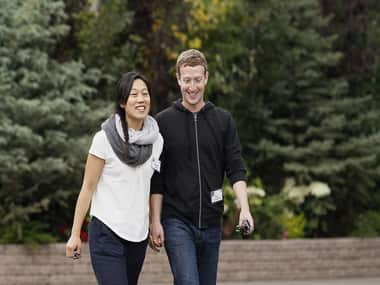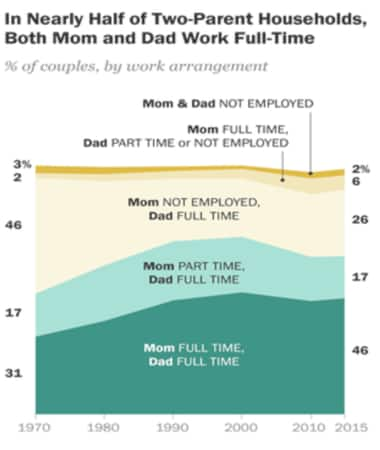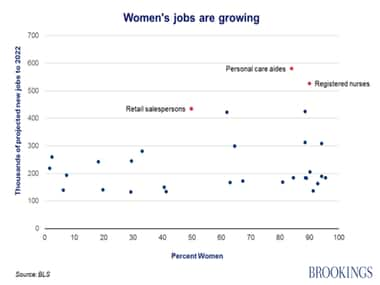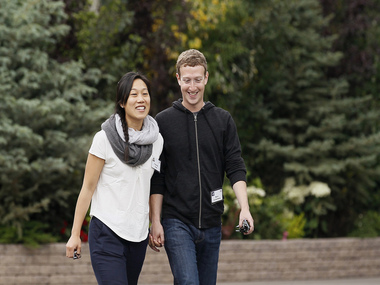NEW YORK: Mark Zuckerberg owns Facebook, he’s more than four times richer than the second-richest person in the US under the age of 40, he’s taking two months paternity leave after his baby girl is born. In a Facebook post, Zuckerberg talks about how “studies show that when working parents take time to be with their newborns, outcomes are better for the children and families.” [caption id=“attachment_2516556” align=“alignleft” width=“380”]
 Mark Zuckerberg and wife Priscilla Chan/ Reuters[/caption] What about the non-Zuckerbergs? Natalie, a clinical psychologist in New Jersey, has just delivered her third baby this summer. She’s started going back to work once a week “just to see how it goes.” “The baby’s bawling for those few hours and misses two feeds because she won’t take a bottle,” says the dad. Dad holds the screaming baby, crams in a school pick up for his two older boys and “comes up for air” when Natalie gets back. “It’s nerve wracking,” he says. With more than 4 in 10 moms coming back into paid work and paternity leave being one of those vague, shadowy topics even in American offices, more than 5 in 10 parents with children under 18 say balancing family and job is “difficult.” New data from Pew Research and Brookings on parents in full and part-time paid work nuances the
Mark Zuckerberg and wife Priscilla Chan/ Reuters[/caption] What about the non-Zuckerbergs? Natalie, a clinical psychologist in New Jersey, has just delivered her third baby this summer. She’s started going back to work once a week “just to see how it goes.” “The baby’s bawling for those few hours and misses two feeds because she won’t take a bottle,” says the dad. Dad holds the screaming baby, crams in a school pick up for his two older boys and “comes up for air” when Natalie gets back. “It’s nerve wracking,” he says. With more than 4 in 10 moms coming back into paid work and paternity leave being one of those vague, shadowy topics even in American offices, more than 5 in 10 parents with children under 18 say balancing family and job is “difficult.” New data from Pew Research and Brookings on parents in full and part-time paid work nuances the
 Zuckerberg post. Attitudes toward balancing job and family life are highly dependant on the parenting experience, say the studies. “For example, parents who say it’s hard for them to strike the right balance between work and family are far less likely than parents who don’t to report that being a parent is enjoyable all of the time (36% vs. 50%).” The findings are not all dismal. Nearly 6 in 10 say being a parent did not make a difference to career advancement. 3 in 10 do claim it’s harder and one in 10 says being a mom or dad has actually helped them at work. Most common rant is how parents “feel rushed”. At least 8 in 10 moms and dads say they constantly hurrying from one domino to another - lessons, homework, soccer, dance, music and houehold chores. Four in 10 working moms say they don’t feel they spend enough time with their kids, “especially when there are school events or parties which clash with work timings”. “We don’t do nights,” says Saul, an Irishman settled in New York. In their home, they’ve figured that anything after 5 pm is no show. “That’s about all I can deal with,” says the father of two boys.
Zuckerberg post. Attitudes toward balancing job and family life are highly dependant on the parenting experience, say the studies. “For example, parents who say it’s hard for them to strike the right balance between work and family are far less likely than parents who don’t to report that being a parent is enjoyable all of the time (36% vs. 50%).” The findings are not all dismal. Nearly 6 in 10 say being a parent did not make a difference to career advancement. 3 in 10 do claim it’s harder and one in 10 says being a mom or dad has actually helped them at work. Most common rant is how parents “feel rushed”. At least 8 in 10 moms and dads say they constantly hurrying from one domino to another - lessons, homework, soccer, dance, music and houehold chores. Four in 10 working moms say they don’t feel they spend enough time with their kids, “especially when there are school events or parties which clash with work timings”. “We don’t do nights,” says Saul, an Irishman settled in New York. In their home, they’ve figured that anything after 5 pm is no show. “That’s about all I can deal with,” says the father of two boys.
 “Women have learned to become more like men. Now men need to learn to become more like women. They must adapt or be left behind,” says Richard V Reeves, Senior Fellow at Brookings in his paper ‘Three reasons Men need Men’s Lib.’ Reeves argues that the “need for men to adapt is urgent, to improve both their job prospects and their marriage prospects, and to help their children.” He offers this data as proof: Jobs are shifting in a ‘feminine’ direction. The fastest employment growth will be in occupations currently dominated by women. In the 30 occupations expected to have the fastest growth in the next seven years, 60 percent of the positions are currently occupied by women. “Kids need fathers as fathers, not just as wage-earners. If we continue to see men’s role in the family as primarily economic, we risk worsening the family divide,” says Reeves. (The term working mom here has been used in the context of paid work and for the purpose of brevity.)
“Women have learned to become more like men. Now men need to learn to become more like women. They must adapt or be left behind,” says Richard V Reeves, Senior Fellow at Brookings in his paper ‘Three reasons Men need Men’s Lib.’ Reeves argues that the “need for men to adapt is urgent, to improve both their job prospects and their marriage prospects, and to help their children.” He offers this data as proof: Jobs are shifting in a ‘feminine’ direction. The fastest employment growth will be in occupations currently dominated by women. In the 30 occupations expected to have the fastest growth in the next seven years, 60 percent of the positions are currently occupied by women. “Kids need fathers as fathers, not just as wage-earners. If we continue to see men’s role in the family as primarily economic, we risk worsening the family divide,” says Reeves. (The term working mom here has been used in the context of paid work and for the purpose of brevity.)
Mark Zuckerberg and paternity leave: 'Kids need dads as dads, not just as wage earners'
Nikhila Natarajan
• November 22, 2015, 08:27:08 IST
With more than 4 in 10 moms coming back into paid work and paternity leave being one of those vague, shadowy issues even in American offices, more than 5 in 10 parents say balancing family and job is “difficult.”
Advertisement
)